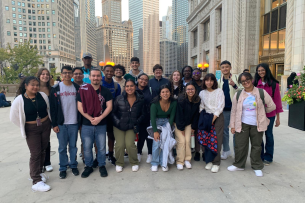Filter & Sort

College Students Provide Mental Health Education to Peers
Learners show a preference for working with peers in addressing their mental health concerns. Here are six examples of peer-led supports offered by higher education institutions.

Career Prep Tip: Specialized Programming for Neurodiverse Students
As the number of college students with disabilities grows, more institutions are investing in individualized programs and initiatives to support their career development and workforce readiness.

A State Calculates the Costs of Dual Enrollment
Ohio’s state auditor finds that half of colleges lose money when accounting for all costs of their programs for high school students.

MLA Delegates Pass Motion Defending Pro-Palestine Speech
A leading opponent of the statement said it represented “an organizational pivot to anti-Zionism.”

Program Innovation: Increasing and Improving On-Campus Work Experiences
University leaders at Binghamton University look to improve student career readiness by creating new and enhancing existing on-campus work opportunities.

Success Program Launch: Scholarship Supports Diversity in STEM
This academic year, 20 students at the University of Chicago began receiving institutional support and additional scholarship money to support their academic pursuits in science, technology, engineering and mathematics fields.

Just Follow the First Amendment
Private colleges should stop taking sides on speech, Max Schanzenbach and Kimberly Yuracko write.

Student Wellness Tip: Create Mental Health Day Reflections
Excused absences for mental health days are growing more common for K-12 learners, but most institutions of higher education don’t allow the same flexibility. One professor shares how he offers—and holds students accountable for—mental health breaks.
Pagination
Pagination
- 163
- /
- 703